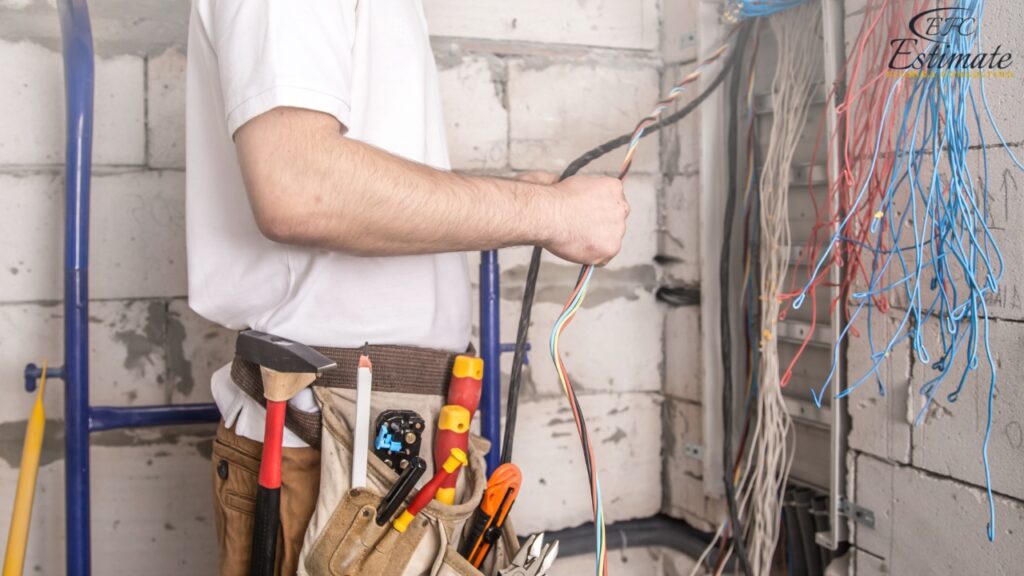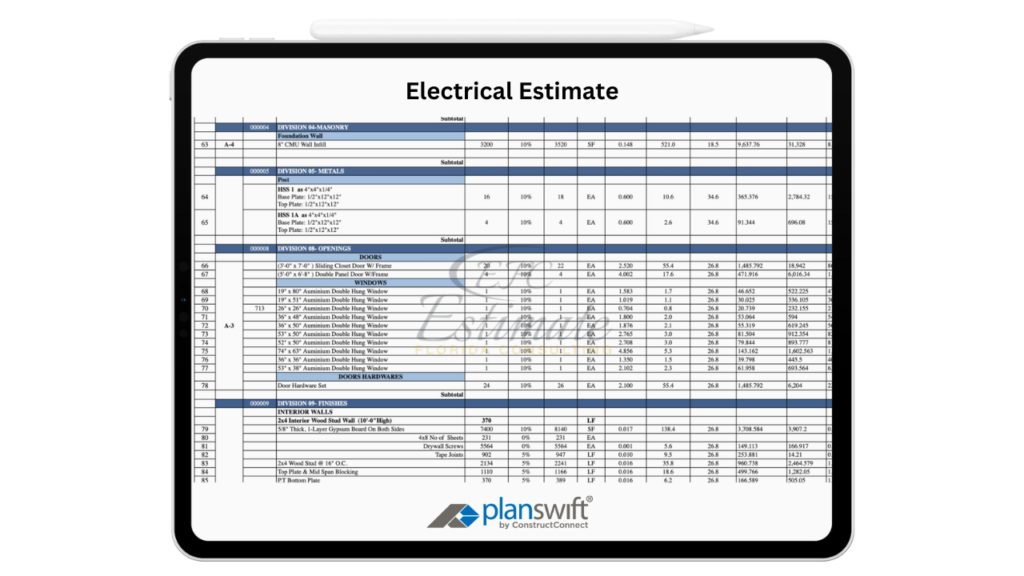How Much Does It Cost to Rewire a Kitchen?
Rewiring a kitchen is a significant project that can enhance both the safety and functionality of your space. The cost of rewiring a kitchen can vary depending on several factors, including the size of the kitchen, the complexity of the wiring system, and the specific electrical requirements of the appliances you intend to use. This guide provides a detailed breakdown of the costs involved, helping you plan and budget effectively for your kitchen rewiring project. By understanding these costs, you can make informed decisions and ensure that your kitchen rewiring project is both efficient and cost-effective, providing long-term benefits for your home.

Average Cost to Rewire a Kitchen
The size of the house is one of the primary factors that affect the cost of redoing electrical work. Larger homes require more materials and labor, leading to higher costs.
House Size | Estimated Cost Range |
Small (1,000 sq ft) | $6,760 – $10,140 |
Medium (2,000 sq ft) | $13,520 – $20,280 |
Large (3,000 sq ft) | $20,280 – $30,420 |
Larger homes not only require more wiring but also more outlets, switches, and circuit breakers. This increased demand for materials and labor results in higher overall costs. Additionally, larger homes may have more complex electrical systems, requiring additional expertise and time to complete the job correctly. In larger homes, there may also be more rooms and specialized areas such as home offices, entertainment rooms, and workshops, all of which need specific electrical configurations. Therefore, understanding the size of your house is crucial in estimating the total cost accurately.
Factors Influencing the Cost
Size of the Kitchen
The size of the kitchen is a primary factor influencing the cost of rewiring. Larger kitchens require more wiring, additional outlets, and more extensive labor, leading to higher costs. For instance, a small kitchen with minimal appliances will cost less to rewire compared to a larger kitchen with multiple high-end appliances and extensive lighting. Additionally, larger kitchens often have more complex layouts, which can increase the amount of time and materials needed for the project, further driving up costs.
Complexity of the Wiring System
The type and number of electrical fixtures in the kitchen will significantly impact the total cost. This includes outlets, light switches, lighting fixtures, and any specialty outlets required for specific appliances. Each fixture requires precise installation to ensure safety and compliance with local building codes. High-quality fixtures and advanced features can increase costs but also provide better performance and durability, making them a worthwhile investment in the long run.
Fixture Type | Estimated Cost per Fixture |
Standard Outlet | $100 – $150 |
GFCI Outlet | $150 – $200 |
Light Switch | $50 – $100 |
Lighting Fixture | $150 – $300 |
Additional Costs
Permits and Inspections
Obtaining the necessary permits and complying with local building regulations are essential steps in the kitchen rewiring process. Permit costs can vary based on location and the scope of the project. Ensuring compliance with local codes helps avoid fines and ensures that the project meets all safety standards. Additionally, permits and inspections provide an extra layer of oversight, ensuring that all work is completed to the highest standards and reducing the risk of future issues.

Permit Type | Estimated Cost Range |
Electrical Permit | $100 – $300 |
Inspection Fees | $50 – $150 |
Permits and inspections are critical to ensure that all electrical work is performed safely and according to code. These steps help protect your investment and ensure the long-term safety of your kitchen. Proper documentation and adherence to local regulations also facilitate future property transactions and insurance claims, providing additional peace of mind.
Labor Costs
Labor costs are another significant component of the overall expense when rewiring a kitchen. These costs can vary based on the complexity of the project, local labor rates, and the experience of the electricians. Skilled labor is essential to ensure proper installation and compliance with local building codes. Experienced electricians can identify potential issues early and provide solutions that enhance the efficiency and safety of the electrical system.
Labor Task | Estimated Cost per Hour |
Electrician | $70 – $120 |
Apprentice | $40 – $60 |
The total labor cost will depend on the time required to complete the project, which can vary based on the size of the kitchen and the complexity of the wiring system. Properly planning the labor component can help avoid delays and ensure the project stays on schedule. Efficient project management and clear communication with the electrical team can optimize labor use and control costs.
Benefits of Rewiring a Kitchen
Rewiring your kitchen offers several advantages, including improved safety, increased electrical capacity, and enhanced functionality. Modern kitchens require more electrical power to accommodate new appliances and technologies, making rewiring an essential upgrade. Additionally, rewiring can help prevent electrical hazards such as shorts and overloaded circuits, providing peace of mind and ensuring the safety of your home. Upgrading the wiring can also improve the energy efficiency of your kitchen, reducing utility costs and supporting sustainable living practices.
Cost Breakdown by Kitchen Size
Here’s a detailed breakdown of the potential costs based on different kitchen sizes:
Small Kitchen (70 - 100 sq ft)
Cost Category | Estimated Cost Range |
Wiring and Materials | $1,000 – $1,500 |
Labor Costs | $1,000 – $1,500 |
Permits and Inspections | $100 – $300 |
A small kitchen typically requires less wiring and fewer fixtures, resulting in lower overall costs. This size is ideal for compact spaces with minimal appliances. Even in a small kitchen, careful planning is essential to ensure that all electrical needs are met efficiently and safely.
90% More Chances to Win Projects With Our Estimate!
- Multi-Family Building
- Hotel Building
- Hospital Building
- Warehouse Building
- School & University Building
- High-Rise Building
- Shopping Complex
- Data Center Building

Medium Kitchen (100 - 200 sq ft)
Cost Category | Estimated Cost Range |
Wiring and Materials | $1,500 – $2,000 |
Labor Costs | $1,500 – $2,000 |
Permits and Inspections | $100 – $300 |
A medium kitchen may have more complex electrical needs, including additional outlets and dedicated circuits for appliances. This size is common in many standard homes and may include a wider range of electrical fixtures. Ensuring that the electrical system can handle all appliances and lighting requirements is crucial for a medium-sized kitchen.
Large Kitchen (200+ sq ft)
Cost Category | Estimated Cost Range |
Wiring and Materials | $2,000 – $2,500 |
Labor Costs | $2,000 – $2,500 |
Permits and Inspections | $150 – $300 |
A large kitchen with multiple high-end appliances and extensive lighting will have higher costs due to the increased complexity and number of electrical fixtures. This size is typical for luxury homes and may include features like under-cabinet lighting, island outlets, and advanced appliance setups. Properly wiring a large kitchen ensures that all appliances function optimally and safely, enhancing the overall usability and aesthetics of the space.
Key Considerations for Kitchen Rewiring
Planning and Design
Proper planning and design are crucial for a successful kitchen rewiring project. This includes determining the placement of outlets, switches, and lighting fixtures, as well as ensuring that the electrical system can handle the load of all your kitchen appliances. Collaborating with an experienced electrician during the planning phase can help identify the best layout and prevent future issues. A well-thought-out design can enhance the functionality and safety of your kitchen while optimizing the use of space and resources.

Upgrading to Meet Modern Standards
When rewiring an older kitchen, it’s important to upgrade the electrical system to meet modern standards. This may involve installing new circuits, upgrading the electrical panel, and using higher gauge wiring to handle increased electrical loads. Upgrading ensures that your kitchen is safe, efficient, and capable of supporting new appliances and technologies. Modern electrical standards also improve energy efficiency and reduce the risk of electrical hazards, contributing to a safer and more sustainable living environment.
Energy Efficiency
Consider incorporating energy-efficient options into your kitchen rewiring project. This can include LED lighting, smart switches, and energy-efficient appliances. These upgrades can reduce your energy consumption and lower your utility bills while enhancing the functionality and aesthetics of your kitchen. Energy-efficient solutions not only save money but also reduce your environmental footprint, supporting broader sustainability goals.
Enhancing Kitchen Functionality
Placement of Outlets and Switches
Strategic placement of outlets and switches can greatly enhance the functionality of your kitchen. Ensuring that outlets are conveniently located for all your appliances, including countertop devices, can make your kitchen more efficient and user-friendly. Properly placed switches can also improve the usability of your kitchen lighting, allowing you to control different zones of lighting independently.
Lighting Design
Effective lighting design is essential for both functionality and aesthetics in the kitchen. Consider using a combination of overhead lighting, under-cabinet lights, and task lighting to create a well-lit space that is conducive to cooking and entertaining. LED lighting is an energy-efficient option that can provide bright, clear light while reducing energy costs.
Cost-Saving Tips
Reuse Existing Wiring
If your existing wiring is in good condition and meets current code requirements, reusing it can save money on your rewiring project. An electrician can assess the condition of your existing wiring and determine if it can be integrated into the new system.
Bundle Projects
If you have other electrical projects in your home, bundling them together can reduce overall costs. For example, if you are also considering rewiring other parts of your home, doing it at the same time as your kitchen can save on labor and permit costs.
Download Template For Electrical Project Breakdown
- Materials list updated to the zip code
- Fast delivery
- Data base of general contractors and sub-contractors
- Local estimators

Conclusion
Rewiring a kitchen is an important project that can enhance the safety, functionality, and value of your home. By understanding the various costs involved and planning accordingly, you can create a realistic budget and ensure a successful rewiring project. Proper planning, quality materials, and skilled labor are essential for achieving a safe and efficient electrical system in your kitchen. Investing in professional rewiring can provide long-term benefits, including improved electrical performance and reduced risk of electrical hazards. Whether you have a small, medium, or large kitchen, careful consideration of all aspects of the project will ensure a successful outcome that meets your needs and enhances your living space. With the right planning and execution, you can transform your kitchen into a modern, efficient, and safe environment that adds value and enjoyment to your home.
FAQs
The average cost to rewire a kitchen ranges from $2,600 to $5,200. This includes materials, labor, and additional expenses such as permits and inspections. The specific cost depends on the kitchen size and electrical needs.
The cost varies based on the kitchen size:
- Small (70 – 100 sq ft): $2,600 – $3,500
- Medium (100 – 200 sq ft): $3,500 – $4,500
- Large (200+ sq ft): $4,500 – $5,200
Factors include the size of the kitchen, complexity of the wiring system, type and number of electrical fixtures, permits and inspections, and labor costs.
More complex wiring systems increase costs. Basic setups have no extra costs, moderate complexity adds $500 – $1,000, and advanced systems add $1,000 – $2,000.
- Standard Outlet: $100 – $150
- GFCI Outlet: $150 – $200
- Light Switch: $50 – $100
- Lighting Fixture: $150 – $300
Additional costs include permits and inspections, which range from $100 to $300 for an electrical permit and $50 to $150 for inspection fees.
Labor costs vary based on the complexity and local rates:
- Electrician: $70 – $120 per hour
- Apprentice: $40 – $60 per hour
Benefits include improved safety, increased electrical capacity, enhanced functionality, energy efficiency, and compliance with modern standards.
Proper planning and design ensure efficient placement of outlets, switches, and lighting fixtures, meeting electrical load requirements, and optimizing space and resource use.
Upgrades may include new circuits, higher gauge wiring, energy-efficient options like LED lighting, smart switches, and energy-efficient appliances.
Google Reviews



Process To Get Rewire a Kitchen in a House Estimate Report
Here I am going to share some steps to get rewire a kitchen estimate report.
-
You need to send your plan to us.
You can send us your plan on info@estimatorflorida.com
-
You receive a quote for your project.
Before starting your project, we send you a quote for your service. That quote will have detailed information about your project. Here you will get information about the size, difficulty, complexity and bid date when determining pricing.
-
Get Estimate Report
Our team will takeoff and estimate your project. When we deliver you’ll receive a PDF and an Excel file of your estimate. We can also offer construction lead generation services for the jobs you’d like to pursue further.

